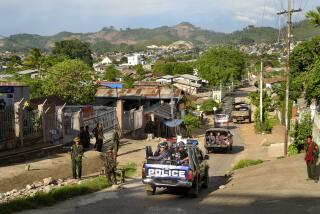Troops Find Graves, Not Hostages at Muslim Camp in So. Philippines
- Share via
ZAMBOANGA, Philippines — Philippine troops gained control of most of a Muslim rebel stronghold in fierce fighting Friday, officials said, but they failed to find the 27 hostages, mostly children, held there for nearly six weeks.
Soldiers found shallow graves believed to contain the bodies of about 20 Abu Sayyaf rebels and suspected that other bodies were hidden in the camp’s network of foxholes, bunkers and tunnels, Deputy Chief of Staff Jose Calimlim said.
“When you get near caves and tunnels, the smell of dead bodies is overpowering,” he said. “We hope this is not of the hostages.”
The hostages were among about 50 people seized from two schools by the rebels March 20. The rebels later released some hostages and said last week that they beheaded two captives as a “birthday present” for President Joseph Estrada.
Officials said 80% of the rebel base on the southern island of Basilan was under the control of government troops. Defense Secretary Orlando Mercado said the rebels might have hidden the hostages in bunkers or tunnels in the heavily forested hillside stronghold.
One soldier was killed and seven wounded in Friday’s fighting, bringing the government toll to six dead and 32 wounded since about 1,500 government troops launched the rescue operation last Saturday, officials said.
Estrada warned Friday that the Abu Sayyaf, a Muslim extremist group accused of past kidnappings, would be “pulverized into ashes.”
“We will not allow their atrocities to continue,” he said.
Meanwhile, a Muslim religious leader acting as a go-between met with a representative of Muslim extremists holding 21 other hostages, including 10 foreign tourists, abducted Sunday from a Malaysian resort island.
About 500 military and police were deployed around a mountain near the town of Talipao in southern Sulu province, where the 21 hostages are thought to be held.
Although both kidnappings--the worst in the Philippines in years--have been blamed on the Abu Sayyaf, they might not be directly related because parts of the group are only loosely connected, officials say.
Prospects for negotiations were unclear after Galib Andang, an Abu Sayyaf commander holding some of the tourists, told a local radio station that the rebels would negotiate only with ambassadors from the hostages’ countries.
He allowed one of the hostages, Carel Strydom of South Africa, to be interviewed by the radio station, DXRZ. In comments dictated by someone whispering next to him, Strydom said they were all in good health and asked the United Nations to tell the Philippine government to stop its military actions against the rebels.
In a separate radio interview, Abu Ahmad, spokesman of the rebels in Basilan, warned that the tourists held in Sulu would be beheaded if their ambassadors refused to negotiate. But it was not clear how much say Abu Ahmad’s group has in the second kidnapping, and Andang did not make a similar threat.
The 21 hostages in Sulu--including tourists from Germany, France, South Africa, Finland, Lebanon and resort workers from the Philippines and Malaysia--were snatched by armed men who invaded the Malaysian resort on Sipadan Island on Sunday.
Nur Misuari, a former rebel leader appointed by Estrada to negotiate, called Friday’s meeting between the unidentified religious leader and the representative from the Sulu kidnappers “a major step.”
Estrada has ruled out any ransom payment for the hostages. A police official said the kidnappers are demanding $2.4 million and the release of relatives jailed in Malaysia for various crimes. According to police, the rebels had agreed to free two Malaysians because they are Muslim.
More to Read
Sign up for Essential California
The most important California stories and recommendations in your inbox every morning.
You may occasionally receive promotional content from the Los Angeles Times.













